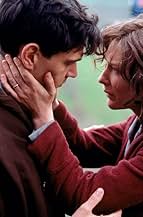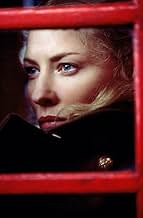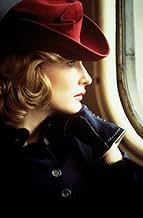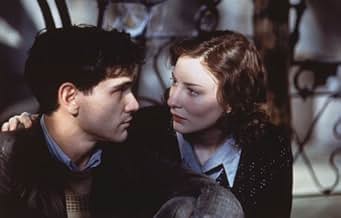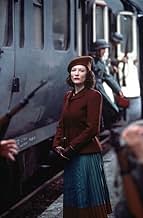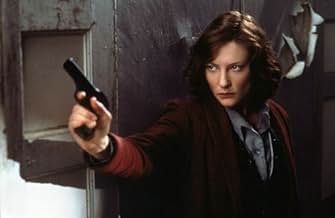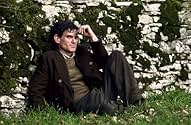NOTE IMDb
6,4/10
14 k
MA NOTE
Ajouter une intrigue dans votre langueA young Scottish woman joins the French Resistance during World War II to rescue her Royal Air Force boyfriend who is lost in France.A young Scottish woman joins the French Resistance during World War II to rescue her Royal Air Force boyfriend who is lost in France.A young Scottish woman joins the French Resistance during World War II to rescue her Royal Air Force boyfriend who is lost in France.
- Réalisation
- Scénario
- Casting principal
- Récompenses
- 6 nominations au total
Rupert Penry-Jones
- Peter Gregory
- (as Rupert Penry Jones)
Mathew Plato
- Jacob
- (as Matthew Plato)
Avis à la une
My wife and I watched this film last night. We both enjoyed it very much. However, I was disappointed to see such a low rating on this website. I think the film is worthy of at least a 7.
I think that several people are missing the point about language. Charlotte did not speak English when she landed; she spoke French. All you have to do is use your imagination. The director obviously chose to use English to avoid having to use subtitles. Besides, acting must be hard enough without having to speak your lines in a foreign language.
Miss Blanchett is high on my list of favourite actors. I thought she played her part exceptionally well. I challenge anyone to say that they were not moved by her displays of emotion. If anyone can recommend any of her other films, I would be grateful.
I think that several people are missing the point about language. Charlotte did not speak English when she landed; she spoke French. All you have to do is use your imagination. The director obviously chose to use English to avoid having to use subtitles. Besides, acting must be hard enough without having to speak your lines in a foreign language.
Miss Blanchett is high on my list of favourite actors. I thought she played her part exceptionally well. I challenge anyone to say that they were not moved by her displays of emotion. If anyone can recommend any of her other films, I would be grateful.
Pretty dreadful adaptation of Faulks' novel.
Gillian Armstrong presents a sanitised version of the book, with much of the meat of Charlotte Gray's relationships removed. Unfortunately the story hangs off the intensity of these relationships she has - with Cannerly and Lavade in particular who are never really given screen time to develop. The acting is pretty dull, and the actors are not really helped by the witheringly dull script. Gambon does his best with what little he is given in the role of Lavade, as does Ron Cook as Mirabel, but Crudup and Blanchett are just not firing on all cylinders. Maybe this is because the story has been so acutely edited, paring away all the extraneous parts of the story but in the end offering a sequence of events that create no tension either as a thriller or a romance.
My other gripe is the art direction. This looks like a made-for-TV drama, with the costumes and mis-en-scene looking fresh, clean and unused. This drama is based in the 1940s during a war, life was dirty and shabby. Armstrong and her production designer give us an unrealistic picture of wartime France and Britain.
Unfortunately this is really just an average British Television Period Drama.
Gillian Armstrong presents a sanitised version of the book, with much of the meat of Charlotte Gray's relationships removed. Unfortunately the story hangs off the intensity of these relationships she has - with Cannerly and Lavade in particular who are never really given screen time to develop. The acting is pretty dull, and the actors are not really helped by the witheringly dull script. Gambon does his best with what little he is given in the role of Lavade, as does Ron Cook as Mirabel, but Crudup and Blanchett are just not firing on all cylinders. Maybe this is because the story has been so acutely edited, paring away all the extraneous parts of the story but in the end offering a sequence of events that create no tension either as a thriller or a romance.
My other gripe is the art direction. This looks like a made-for-TV drama, with the costumes and mis-en-scene looking fresh, clean and unused. This drama is based in the 1940s during a war, life was dirty and shabby. Armstrong and her production designer give us an unrealistic picture of wartime France and Britain.
Unfortunately this is really just an average British Television Period Drama.
Charlotte Gray was something of a box-office disaster in the States, which damaged its reputation in the rest of the world. While it's not hard to see why American audiences didn't go for it, it's harder to understand the malice European critics greeted it with. It's a pretty good portrait of resistance infighting (the Communists are setup by the De Gaullists as liberation approaches), local collaboration (the schoolteacher gladly helps the Nazis root out Jewish families) and the nuts and bolts of resistance work. No great heroics or big setpieces, which is probably why it tanked: the big climax is more an emotional risk than the rescue audiences probably wanted. Performances are mostly good - Blanchett is much better than contemporary reviews would have you believe in particular. There are better films, but it's a good movie and for my money better than the alright Lucie Aubrac. I liked it enough to buy the DVD.
Is Cate Blanchett the best actress today? I start believing it. She just performed superbly in all the last films I saw. Almost any critic I read compares her with Meryl Streep, and no wonder - she has the interior strength and beauty that makes her shine in all roles, without being of a remarkable physical beauty.
Unfortunately, 'Charlotte Gray' cannot offer Cate Blanchett a good script to turn it in a Big movie. The story is quite un-believable, and if it has any logic it is Hollywood logic. Hard to believe an anonymous girl can train and become a spy just because she wants to search for her disappeared lover, and we never get any sense of the reasons she is being sent for. The Holocaust story is spoiled and sentimental a la Hollywood, and the characters behave without any real interior reason, just as the cliches of big studios American movies ask. Most awful is the treatment of the language. Blanchet is a Scot, lives in London, and then is sent to France because she is speaking fluent French. All the movie is spoken in English. Why? Language plays a role in the spying game, and if French was used in the scenes happening in France, much credibility could have been added.
Despite all the film is watchable, and I enjoyed every second Cate Blanchett is on screen. I am looking forward for the great movies and the Oscars to come, as she deserves.
Unfortunately, 'Charlotte Gray' cannot offer Cate Blanchett a good script to turn it in a Big movie. The story is quite un-believable, and if it has any logic it is Hollywood logic. Hard to believe an anonymous girl can train and become a spy just because she wants to search for her disappeared lover, and we never get any sense of the reasons she is being sent for. The Holocaust story is spoiled and sentimental a la Hollywood, and the characters behave without any real interior reason, just as the cliches of big studios American movies ask. Most awful is the treatment of the language. Blanchet is a Scot, lives in London, and then is sent to France because she is speaking fluent French. All the movie is spoken in English. Why? Language plays a role in the spying game, and if French was used in the scenes happening in France, much credibility could have been added.
Despite all the film is watchable, and I enjoyed every second Cate Blanchett is on screen. I am looking forward for the great movies and the Oscars to come, as she deserves.
This film is a love story, loosely based on the real-life heroism of WWII. Those who enjoy such films would not have been disappointed by Charlotte Gray.
Unfortunately, Channel 4 decided to precede the film with the transmission of a documentary about the real-life heroines, whose personal sacrifices, pragmatic courage and strength of character shone out of my TV in a way that had me close to tears. The film, which followed, showed none of the iron self-discipline, the de-sensitising effect of war nor the constant fear of discovery these people lived with, but concerned itself with emotional story lines that would have been at home in any modern love story, loosely based on any social environment you care to choose. Far from blending into the background, along with the oppressed French population, Cate Blanchett was often portrayed parading in high heels and flattering autumnal colours, looking like a million francs
Too frequently for this viewer, it dipped into the downright absurd, e.g. having a) the male lead exposing himself to danger in an astonishing, barking tirade at German troops, b) the collaborationist French schoolteacher volunteering to the goodies that he was a snitch for the Germans and c) Charlotte herself somehow persuading a gendarme not to reveal her whereabouts to his search party colleagues, even when safely out of range of her pistol.
What a wonderful piece of history it was. And what a wonderful film could have been made of it (with the same cast too; the individual performances were all perfectly OK, especially in the minor roles).
Unfortunately, Channel 4 decided to precede the film with the transmission of a documentary about the real-life heroines, whose personal sacrifices, pragmatic courage and strength of character shone out of my TV in a way that had me close to tears. The film, which followed, showed none of the iron self-discipline, the de-sensitising effect of war nor the constant fear of discovery these people lived with, but concerned itself with emotional story lines that would have been at home in any modern love story, loosely based on any social environment you care to choose. Far from blending into the background, along with the oppressed French population, Cate Blanchett was often portrayed parading in high heels and flattering autumnal colours, looking like a million francs
Too frequently for this viewer, it dipped into the downright absurd, e.g. having a) the male lead exposing himself to danger in an astonishing, barking tirade at German troops, b) the collaborationist French schoolteacher volunteering to the goodies that he was a snitch for the Germans and c) Charlotte herself somehow persuading a gendarme not to reveal her whereabouts to his search party colleagues, even when safely out of range of her pistol.
What a wonderful piece of history it was. And what a wonderful film could have been made of it (with the same cast too; the individual performances were all perfectly OK, especially in the minor roles).
Le saviez-vous
- AnecdotesThe true story of Nancy "White Mouse" Wake inspired Sebastian Faulks' 1999 novel Charlotte Gray upon which this movie was based. Australian Prime Minister Julia Gillard said Mrs. Wake was "a truly remarkable individual whose selfless valor and tenacity will never be forgotten." Born in New Zealand, but raised in Australia, she is credited with helping hundreds of Allied personnel escape from occupied France. Working as a journalist in Europe, she interviewed Adolf Hitler in Vienna in 1933 and then vowed to fight against his persecution of Jews. After the fall of France in 1940, Mrs. Wake became a French Resistance courier and later a saboteur and spy, setting up escape routes and sabotaging German installations, saving hundreds of Allied lives. She worked for British Special Operations and was parachuted into France in April 1944 before D-Day to deliver weapons to French Resistance fighters. At one point, she was top of the Gestapo's most wanted list. "Freedom is the only thing worth living for. While I was doing that work, I used to think it didn't matter if I died, because without freedom, there was no point in living", Mrs. Wake once said of her wartime exploits. It was only after the liberation of France that she learned her husband, French businessman Henri Fiocca, had been tortured and killed by the Gestapo for refusing to give her up. She was Australia's most decorated servicewoman, and one of the most decorated Allied servicewomen of World War II. France awarded her its highest honor, the Legion D'Honneur. She also received Britain's George Medal, and the U.S. Medal of Freedom. In 2004, she was made Companion of the Order of Australia. She died in London on August 8, 2011 at the age of ninety-eight.
- GaffesThe German colors during the Nazi Regime were actually Black, White and Red. These were also the colors of the N.S.D.A.P. and were present on the shield of the German helmets of the Wehrmacht and all of the flags at this time. So the Bundesrepublik Deutschland (West German) colors of Black, Red and Yellow are not appropriate for the film.
- Citations
Psychiatrist: Of these three, which in your view is the most important: Faith, hope or love?
Charlotte Gray: Hope.
- Bandes originalesBlack Eyed Susan Brown
Master performed by Phil Harris and his orchestra featuring The Three Ambassadors
By courtesy Hindsight Records
Written by Al Hoffman and Al Goodhart
Published by Keith Prowse Music Publishing Co Ltd
Meilleurs choix
Connectez-vous pour évaluer et suivre la liste de favoris afin de recevoir des recommandations personnalisées
- How long is Charlotte Gray?Alimenté par Alexa
Détails
- Date de sortie
- Pays d’origine
- Site officiel
- Langue
- Aussi connu sous le nom de
- Шарлотта Грей
- Lieux de tournage
- Sociétés de production
- Voir plus de crédits d'entreprise sur IMDbPro
Box-office
- Budget
- 20 000 000 $US (estimé)
- Montant brut aux États-Unis et au Canada
- 741 394 $US
- Week-end de sortie aux États-Unis et au Canada
- 46 271 $US
- 30 déc. 2001
- Montant brut mondial
- 5 323 109 $US
- Durée
- 2h 1min(121 min)
- Couleur
- Mixage
- Rapport de forme
- 1.85 : 1
Contribuer à cette page
Suggérer une modification ou ajouter du contenu manquant







